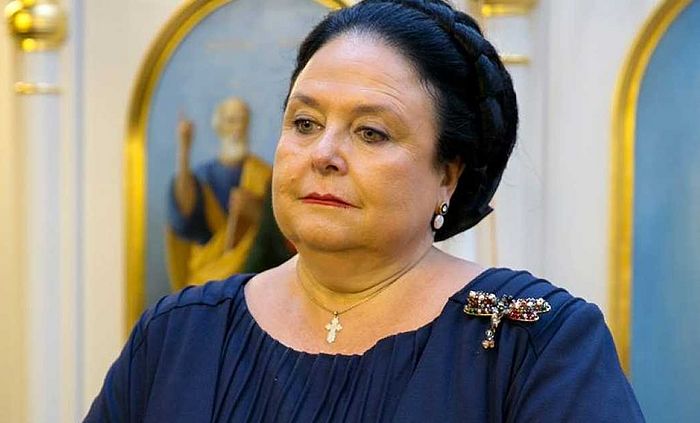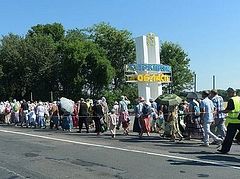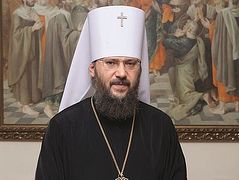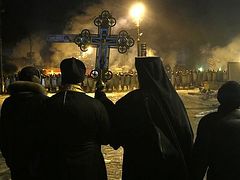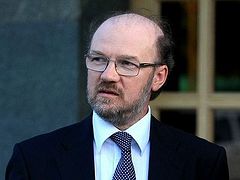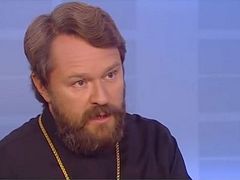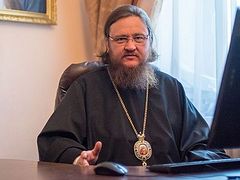In early September, during a meeting of the Council of Bishops of the Church on Constantinople in Istanbul, His All-Holiness Patriarch Bartholomew announced that he is taking the initiative to overcome the Ukrainian schism, “since Russia, being responsible for today’s strife in Ukraine, is unable to solve the problem.” The Patriarch said that the reason for this was the appeal by the Ukrainian government and the leader of the self-declared “Kiev Patriarchate.” Soon thereafter, the Patriarch of Constantinople appointed two exarchs to Kiev “within the framework of preparations for granting autocephaly to the Orthodox Church in Ukraine.” In response, the Synod of the Russian Orthodox Church called it a “crude trampling of canon law” on the part of the Constantinople Patriarchate. According to the Synod, the actions of Patriarch Bartholomew lead to an impasse in the relationship between the Russian and Constantinople Churches and “establish a real threat to unity of world Orthodoxy.”
In connection with this matter, Interfax asked Her Highness Grand Duchess Maria Vladimirovna, Head of the Russian Imperial House, to comment on the statement of Patriarch Bartholomew, whom she knows personally.
- Your Imperial Highness, what is your opinion of the latest news on the situation of the Church in Ukraine and the announcement of Patriarch Bartholomew of Constantinople?
- I heard reports of the radical steps taken by Patriarch Bartholomew of Constantinople, who is meddling in Church matters in Ukraine, with sorrow and alarm. I see that this has provoked a sharp increase in tension, both in Ukraine and in the entire Orthodox world. I had great hopes that after the visit made by Patriarch Kirill to Constantinople and the meeting of the two primates, that concord between the Constantinople and Moscow patriarchates would strengthen. Instead, Constantinople delivered a demarche, completely ignoring the position of the Russian Orthodox Church and the canonical Ukrainian Orthodox Church. This step could not but evoke in me sorrow and extreme bewilderment.
- Do you have detailed information on the situation of Orthodox Christians in Ukraine?
- Yes, I follow official statements, discussions and publications in the press. My chancery keeps me informed on historical, legal matters and news.
- Judging by what you just said, you are clearly on the side of the Russian Orthodox Church. Don’t you think that you only get one-sided information? Are you familiar with the arguments of the Ecumenical Patriarchate and the proponents of autocephaly in Ukraine?
- I never hid the fact that I am a faithful daughter of the Russian Orthodox Church, I trust its hierarchy and to the best of my ability serve towards the preservation of the canonical unity of the flock of the Moscow Patriarchate and the traditions developed in the Russian part of the Orthodox world.
At the same time, our House always had spiritual connection with the hierarchies of other Local Churches. During the persecution of the faith in the USSR and our forced isolation from our Homeland, many of them offered us invaluable help. One need only remember that it was thanks to the Church of Constantinople that my grandfather, grandmother and parents were able to preserve and legalize the Orthodox community they established in Madrid. For many years, when they did not allow Russian churches in Spain, we frequented the Church of SS Andrew and Dimitry, built by this community and belonging under the omophorion of the Constantinople Patriarchate.
That is why our relationship with the primates and clergy of all Churches, which comprise the fullness of Orthodoxy, is so dear. If I hear that there are conflicts between sister Churches, I do not deem it possible to express my position, especially to make any statements, until I examine all arguments first.
My attitude towards church life in Ukraine is not only founded on my belonging to the Russian Orthodox Church, but on an understanding of history and the personal experience I gained while participating in peace-making efforts.
- Patriarch Bartholomew claims that the Church of Constantinople since the time of the Ecumenical Councils has the right to decide all disputes of Orthodoxy throughout the world…
- I am not a canon expert, and won’t assume the responsibility of analyzing the positions in detail. This should be left to experts. I will only talk about commonly-known facts, and what should be drawn from Christian love and sound mind, without in-depth specialized analysis.
The Constantinople Patriarchate occupies the first place among all the Orthodox Churches. It is “first among equals.” No one argues this fact. But in the Orthodox world, in contrast with the Roman Catholic Church, where they teach the infallible leadership of the Pope, there is no such supremacy. All matters are decided on the basis of collegial agreement.
The canons which grant the Church of Constantinople certain functions of arbitration and coordination are established exclusively on conditions that have not existed for over 500 years.
This stemmed from the fact that the See of Constantinople was located in the “Royal City,” the “New Rome,” the spiritual and political center of the Roman Empire. It was this factor that was emphasized in all the canons adopted by the Ecumenical Councils with regard to the Church of Constantinople as the reason for granting it certain additional authorities.
Only the existence of a direct connection between the bishop of Constantinople and the emperor, who was revered as the sacral and legitimate ruler of the “oikoumen” [the entire inhabited world—transl.] gave these hierarchs not only a titular but the real status of being “Ecumenical.” There was no other basis for this.
But in 1453, the Eastern Roman Empire ceased to exist. The reality which gave the basis of granting the patriarchs of Constantinople the right of a supreme and final arbitrator for Orthodox Christians who were not directly in the jurisdiction of the Constantinople Church suddenly disappeared.
The traditional primacy and honor and even title “Ecumenical” have remained with the patriarch of Constantinople, and all Orthodox Christians are in agreement on this. Still, the symphony between church and royal power, which existed at one time at the highest level in Constantinople and was the basis for legal processes within the undivided Church and Empire, was lost in the 15th century.
- Still, Rus in 988 received its baptism from Constantinople. Russian metropolitans were for many years appointed by the Ecumenical patriarchs. The autocephaly of the Russian Church was recognized by them, and the first Russian patriarch was appointed by the Constantinople patriarch. Doesn’t this mean that the Russian Orthodox Church must consider the Constantinople Church as its Mother Church and obey her?
- You know, at one time the cathedra of Constantinople was under authority of the Antiochian Church. That is, the Antiochian Church is historically the Mother Church of the Constantinople Church. But this does not mean that Antiochian patriarchs have any right to meddle in the affairs of the Church of Constantinople.
Of course, there are pious traditions that hold that the Constantinople Church was founded by Apostle Andrew the First-Called. But the same tradition applies to the Russian Church. It can’t be proven historically. It is an object of faith. But the extant legal acts clearly demonstrate the ascent of the Constantinople cathedra.
When the first Rome lost some of its influence, the new capital founded by Constantine the Great became the “Royal City,” and the prestige of the Constantinople cathedra grew. In some ways this is similar to our own history, when power moved first to Vladimir, then to Moscow.
The Russian Church obtained autocephaly during the period that Moscow dominated. The patriarchate was in fact established in Moscow. By the way, the Moscow patriarchs were recognized as fifth in honor, right after the patriarchates whose succession is in the diptychs established by the Ecumenical Councils. This was because the Russian tsars considered themselves the spiritual heirs to the Roman and Byzantine Empires, and this was recognized not only by their own subjects, but by many in the rest of the Orthodox world. One can argue at length about the degree and the scope of this recognition, but it is recorded in many official documents.
Of course, we will never forget about the maternal aspect of the Church of Constantinople with regard to the Russian Church. In any case, whenever one Church or another is granted autocephaly, it moves from being a “daughter Church” to a “sister Church.” And the right to full independence in addressing its internal affairs is granted to her.
- The Constantinopolitan and Ukrainian advocates for separation from the Moscow Patriarchate say that the Kievan Metropoliate remained under authority of Constantinople, and in the 17th century was given to Muscovite control under political pressure and only temporarily. That is why today, when Ukraine has become an independent nation, the Ecumenical Patriarchate, in their opinion, must restore her rights and take upon herself the responsibility to “overcome schism.”
- The Kievan cathedra has for over 300 years been in the jurisdiction of the Russian Orthodox Church. There is no mention on a temporary nature of this situation in Church documents. If it were so, it would be enough to quote such a canonical document. But no one is able to do this. Even if, at the end of the 17th century, someone in Constantinople or Little Russia [present-day Ukraine—transl.] was unhappy with the situation, then the status that was preserved by all for so long has legitimized it.
In the 1990’s, the Orthodox Church in the Ukrainian state, which obtained independence, received from Moscow broad autonomy, but maintained unity with it. In this canonical Ukrainian Orthodox Church, recognized even now by the Constantinople Church and all other Local Churches, there are far more parishes and parishioners than in the other “alternative,” uncanonical jurisdictions not recognized by universal Orthodoxy. Yes, there are among some clergymen and faithful of the canonical Ukrainian Orthodox Church proponents of autocephaly. But they are in the minority. In any case, the official position of the Ukrainian Orthodox Church is to preserve unity with the Russian Orthodox Church in the form it exists today. To decide on church matters in the Ukrainian government without taking heed of the position of the lawful hierarchy of the Ukrainian Orthodox Church and against it is uncanonical, unfair and is fraught with disaster.
- Patriarch Bartholomew did not yet formalize, but only, in his words, began preparations for the autocephaly of the Ukrainian Orthodox Church. For this purpose, two exarchs were appointed. Many consider this intermediate role to be proper, since for so many years, the Orthodox in Ukraine themselves could not overcome the schism, and the Moscow Patriarchate has also not resolved this issue.
- We shouldn’t forget that the Church is not just a collection of rules, traditions, holy buildings and objects, but first of all it is comprised of people of faith, clergymen and laity, who confess the faith in Christ and who follow His commandments of Love. Even correct and well-founded decisions cannot be enacted through the use of force, or under intense pressure, which can only lead to new confrontation. One especially cannot force people, to put it mildly, to accept debatable decisions whose basis is far from clear.
The efforts of the Constantinople Patriarchate to mediate could be useful only under certain conditions. Most important, first of all, is that such efforts should be approved by all sides, and not imposed from without. Secondly, the mediators should enjoy great authority in the Orthodox world, have a reputation of being objective, experienced, spiritual and wise hierarch, not to have been previously drawn into conflict.
Both conditions are absent. “The preparation of autocephaly” was initiated despite the wishes of the Russian and Ukrainian Orthodox Churches, and entrusted to two bishops whose independence and objectivity is not even a matter of discussion.
At the same time, in the very declaration of Patriarch Bartholomew, the motives were not ecclesiastical but political. He expressed the point of view that today’s political instability in the Ukrainian state is the fault of Russia. I must remind you that the instability was caused by the coup in Kiev in 2014, when the lawfully-elected president was overthrown. This was clearly not caused by pro-Russian political forces. And however future events unfolded, firstly, you cannot call one side to blame for everything and the other innocent, and secondly, the Church must not pour gasoline on the flames, but do everything towards reconciliation.
I know that in churches of the Russian Orthodox Church, at every Liturgy, a prayer for the suffering Ukraine and her people is read. Even if someone makes claims towards one politician or another, neither Patriarch Kirill nor Metropolitan Onouphry, nor other hierarchs of the Russian and Orthodox Churches has given any reason to doubt the earnestness of their striving for peace. They pray and expend efforts for the Ukrainian people to return to ecclesiastical, national and civil peace.
- That is, you think that the position of Patriarch Bartholomew is dictated not by ecclesiastical but political reasons?
- Unfortunately, I cannot find any other explanation. For world Orthodoxy, the steps leading to an unavoidable rift between the Church of Constantinople and the Russian Orthodox Church are truly catastrophic.
The spiritual bonds between the brotherly peoples of Russia and Ukraine have ancient roots. Kiev is called the “mother of Russian cities” in the chronicles. The ancestors of Ukrainians and Russians died side by side, defending their one Fatherland. Efforts to destroy this civilized unity and the sowing of discord is of course a political plan aimed at subjecting Ukraine to the geopolitical rivals of Russia and the weakening of the international standing of our nation. Within the framework of this project is activity aimed at fracturing the Orthodox Christian pillars erected in Kievan Rus and further developed in the Moscow regime and the Russian Empire, which endured even in the epoch of the most brutal militantly godless persecutions in the USSR. The people who lead this effort are, let’s be clear, very far from the Church.
- But the history of the Russian Orthodox Church and her relationship with the Constantinople Patriarchate is also far from being smooth and objective.
- Yes, there is nothing ideal in earthly life. And it is impossible to fully separate spiritual life and politics, lofty goals and self-interest, care for others and egotism, sincerity and guile.
In the history of Russia and the Russian Church, there have also been various situations connected to sin, craftiness, abuse of privilege, the use of force, blackmail and corruption. We shouldn’t assume a “Hottentot morality” [“what’s good for me is good, what’s bad for me is bad”—transl.] and think that we are always right in all things, and others wrong only because they have their own interests distinct from ours.
But history is given to us not only so that we seek out justification for new abuses and for revenge for insults from three hundred years ago, but so that we can learn its lessons and at least consciously and persistently avoid repeating that which brought us and others sorrow in times past.
If the Patriarch of Constantinople feels that Russian Tsars or bishops of the Russian Church were not entirely fair and tactful in dealing with him, this does not give him an excuse to permit himself an analogous or even worse injustice on this new page of history, and make millions of people hostages of such dubious revanchism.
And if, for example, the Church of Constantinople always solemnly and consistently condemned phyletism (the tendency in ecclesiastical circles of some countries to place narrowly-national interests above overall Church interests), then in Ukraine’s situation, she cannot in any way support this blatantly phyletic politicized scheme.
- Do you know Patriarch Bartholomew personally?
- Yes, I know His All-Holiness for a long time. I met him in his residence in Phanar during my visit to Turkey. Our conversation centered on questions of overall Church unity, the brotherly bonds of the Churches of Constantinople and Russia, cooperation between Orthodox Christians and in general, between all those who believe in God in the face of the perils caused by the spread of atheism, immorality, cynicism, the sacrifice of spirituality and dignity of individual life to political or economic egotism.
I hold very warm memories of this meeting, of the person of Patriarch Bartholomew, his spiritual manner, his lofty intellect, his good will and restraint. That is why it is especially painful for me to see how inter-Church bonds are being torn, brotherly relations ruined and the Orthodox world being weakened.
- Do you intend to communicate your opinions to Patriarch Bartholomew?
- I am prepared to do this if I feel that such a step would serve towards Church peace. But I need to know the opinions of Patriarch Kirill and Metropolitan Onouphry of the efficacy of such a communication. One of the main, underlying ideas preserved by the Imperial House is the principle of symphony. According to this principle, the Church hierarchy and those who bear the burden of Royal service support each other, but do not directly interfere in the work of the other side in the absence of consent or a request. The oath of the physician should be applied here: “first do no harm.” I very much hope that the wellsprings of direct inter-Church dialog have not run dry.
- What could the consequences of a de-facto legitimization of schism be for Ukraine?
- I don’t doubt that if events continue along this path, it will only deepen the crisis and will prolong this new dire and tragic period in the history of Ukraine, Russia, the Orthodox world, and in general it will have a negative effect on the international situation.
Of course, the Church will survive until the end of times, and the unity of civilization between Russia and Ukraine will be reestablished. The period of enmity will be replace by a period of reconciliation and forgiveness. This has happened many times in past epochs. This is a law of History. But the sooner we can cease inflicting wounds upon each other, and instead, heal them, the less suffering there will be in the near and foreseeable future. I pray for everyone, so that the spirit of Christ’s love and justice prevail in our hearts.
Interfax.ru
Translation by the ROCOR website

